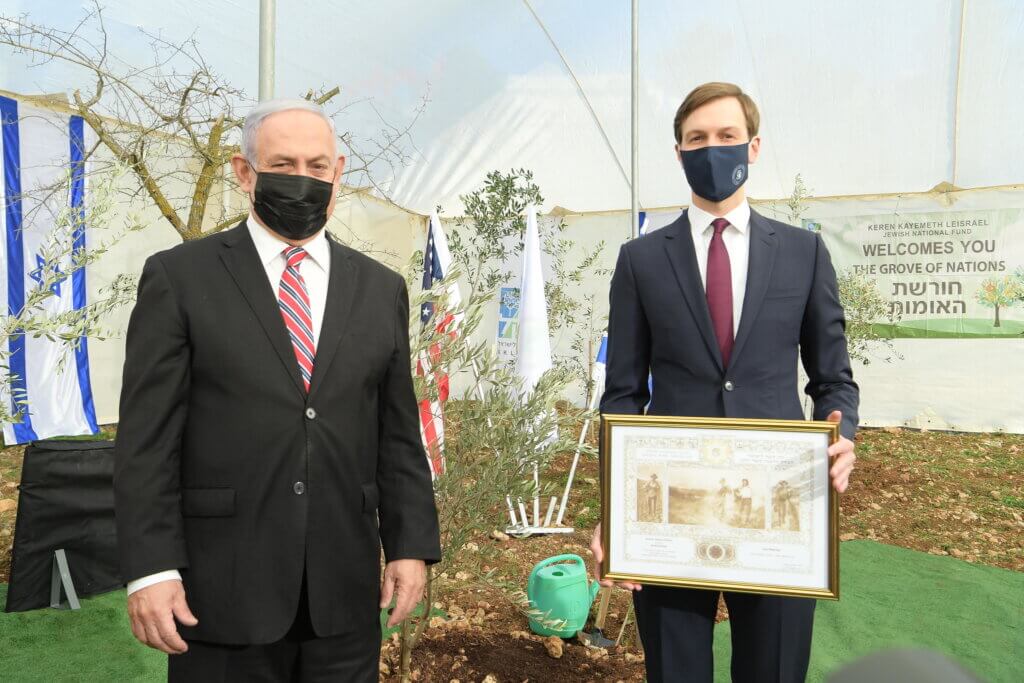Is Trump’s ‘Deal of the Century’ back on the table?

It’s easy to forget now, but on January 28, 2020 the Trump administration released a political plan for Israel and Palestine.
Dubbed “The Deal of the Century,” the outline was developed by Trump’s son-in-law and political adviser, Jared Kushner, and came just months after the economic part of the plan had been presented at a workshop in Bahrain. In total, the plan amounted a an annexation plan where large parts of the occupied Palestinian West Bank would
Now as Trump re-enters office, it’s unclear whether the new Trump team will return to the Kushner plan, but the political support for West Bank annexation has only grown in Israel since Trump’s first term. Israeli Finance Minister Bezalel Smotrich has named 2025 as “the year of Israeli annexation of the West Bank,” and there is already growing concern about what Trump might have promised Netanyahu’s government in order to push the recent ceasefire over the edge. Combined, these factors are joining together to raise concerns the “deal” might be back on the table, or that it may serve as a model for Israeli annexation in the near future.
The “Deal of the Century”
The “deal” was formally announced in January 2020, and was put together without any input from Palestinian leaders and predictably offered them virtually nothing. It would have redrawn boundaries to include illegal Israeli settlements, annexed the Jordan Valley, recognized Jerusalem as the “undivided capital” of Israel (while curiously acknowledging it could also become the capital of a hypothetical Palestinian state), required Palestine to be demilitarized, and denied Palestinian refugees the Right to Return.
As part of the plan, the Palestinians would also have to recognize Israel as a Jewish state, refrain from joining international organizations, and dismiss all pending legal action against Israel at the International Criminal Court.
Experts dismissed the plan as a “total shitshow”that was “dead on arrival” and purposely developed in order for the Palestinian Authority to reject it.
However, Trump’s vision was predictably embraced by Israeli leaders and his pro-Israel supporters in the United States.
“I believe that down the decades, and perhaps down the centuries, we will also remember January 28, 2020, because on this day, you became the first world leader to recognize Israel’s sovereignty over areas that are vital to our security and central to our heritage,” Israeli Prime Minister Benjamin Netanyahu told Trump at a White House press conference announcing the plan.
The Republican Jewish Coalition called it “a bold and nuanced proposal that is deeply rooted in America’s core values of liberty, opportunity and hope for the future.” The American Israel Public Affairs Committee (AIPAC) praised “the efforts of President Trump and his administration to work in consultation with the leaders of the two major Israeli political parties to set forth ideas to resolve the conflict in a way that recognizes our ally’s critical security needs.”
The late GOP megadonor Sheldon Adelson and his wife, Miriam, were in the front row at the announcement. Although Sheldon has since passed, Miriam has remained a major Trump supported and donated an estimated $100 million to his 2024 re-election campaign.
New administration’s first moves
Though the new Trump administration has yet to put forward any concrete policies around Palestine and Israel, Trump has made a series of comments and moves since taking office that paint a picture of what his administration’s approach to the region may look like.
While signing Executive Orders shortly after his inauguration, Trump told reporters he had little faith in the Gaza ceasefire holding. “It’s not our war. It is their war. I am not confident,” saidTrump.
Despite this statement, Trump has made no indication that he plans to halt weapons shipments to Israel. On the contrary, he has reportedly resumed shipments of 2,000-pound bombs to the country.
“We believe that Trump is going to release, at the beginning of his term, the munitions that haven’t been released until now by the Biden administration,” outgoing Israeli ambassador to the United States Mike Herzog told Axios.
In another move that stands to threaten the ceasefire agreement, the Trump administration is lifting sanctions on violent, far-right settler groups in the occupied West Bank. The move comes amid rising anti-Palestinian violence in the area. Just hours before Trump canceled the sanctions, dozens of Israeli settlers attacked homes and businesses in the West Bank towns of Jinsafut and Al-Funduq. The Palestinian Red Crescent said they treated 12 men who were beaten by the settlers.
“The settlers were masked and had incendiary materials,” Jinsafut’s village council head Jalal Bashir told the AP. “Their numbers were large and unprecedented.”
On social media Israeli far-right Finance Minister Bezalel Smotrich celebrated the sanctions being lifted and praised Trump’s “unwavering and uncompromising support for the state of Israel.”
At the White House signing, Trump also spoke about the attractiveness of Gaza’s location and weather, but refused to reveal whether the United States would assist in rebuilding the area.
“I looked at a picture of Gaza, it’s like a massive demolition site. It’s really … it’s gotta be rebuilt in a different way. Gaza’s interesting, it’s a phenomenal location. On the sea, the best weather. Everything’s good. Some beautiful things can be done with it. It’s very interesting. Some fantastic things can be done with it,” he told reporters.
The comments are very similar to ones that Kushner made last year, in which he praised the “very valuable” potential of Gaza’s “waterfront property.”
“Gaza’s waterfront property could be very valuable … if people would focus on building up livelihoods,” Kushner told an interviewer.
Kushner is not expected to take a formal position with the administration during this term, but will reportedly be a “pivotal” part of Trump’s Middle East policy.


No comments:
Post a Comment